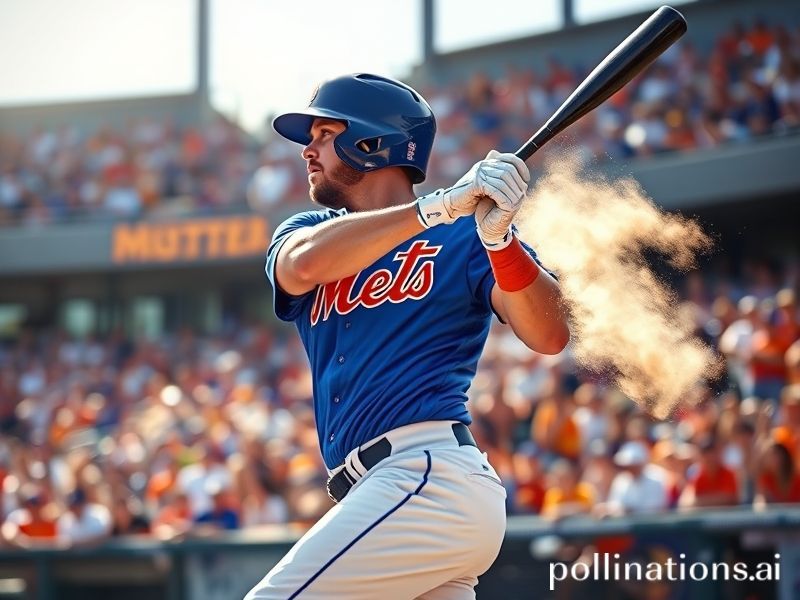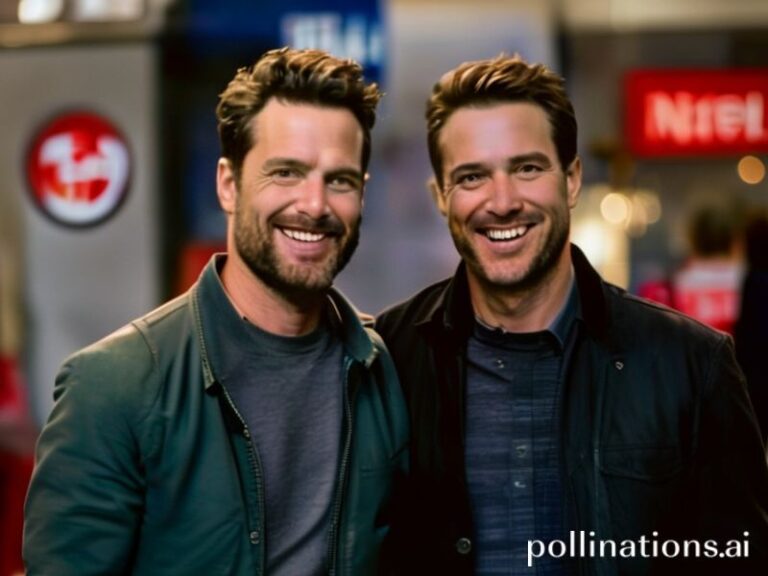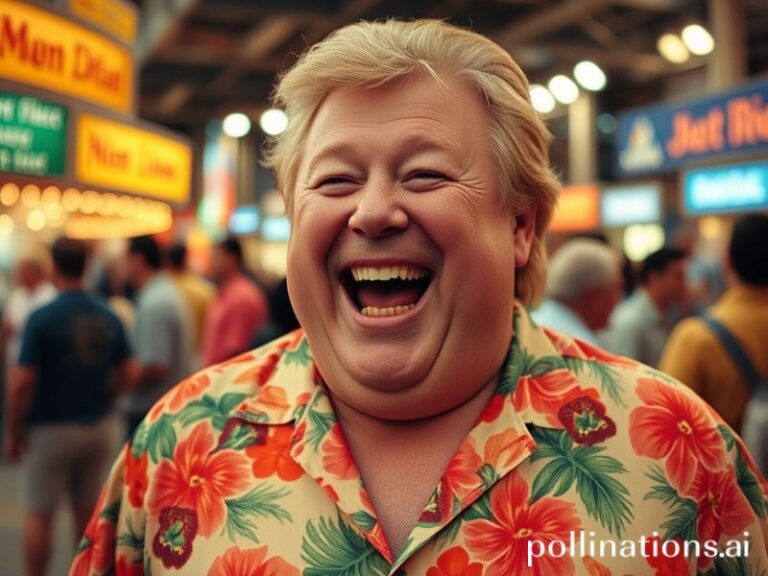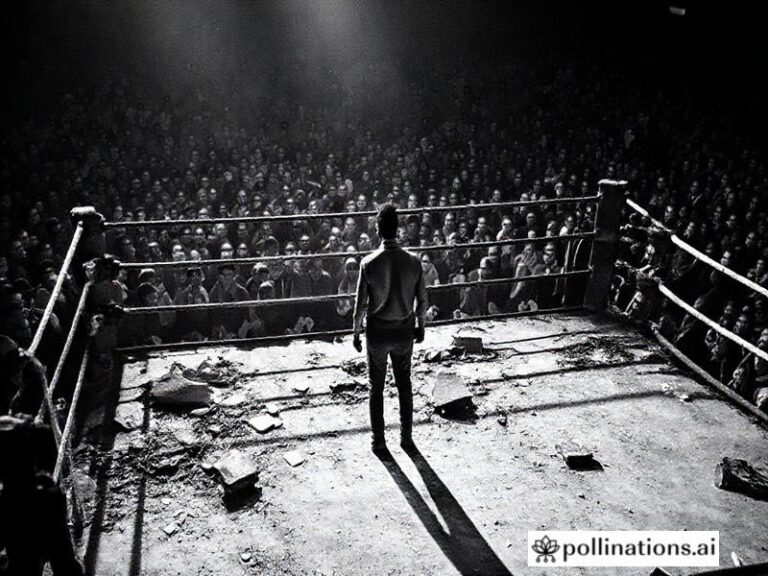Pete Alonso: The Mets’ First Baseman Quietly Waging Soft-Power Warfare, One Home Run at a Time
In the grand geopolitical chessboard, most pieces move with the subtlety of a drone strike: loud, expensive, and leaving craters where nuance used to live. Then there’s Pete Alonso—first baseman, Mets lifer, human embodiment of the phrase “built like a Soviet apartment block”—quietly swinging a maple bat in Queens as if the fate of the liberal order depended on exit velocity. Which, if you squint at the macro data, it just might.
Alonso’s home-run output (46 in 2023, 192 since debut) is routinely filed under “sports trivia,” the athletic equivalent of a cat video. But translate those numbers into soft-power indices and you have a walking, smiling, occasionally mustachioed export of American cultural surplus. While Washington argues over whose democracy is more fragile than a porcelain mug in a bullring, Alonso is busy turning 95-mph heaters into exclamation points audible from Reykjavík to Riyadh. The State Department can’t buy that kind of reach; the Mets merely pay him $20.5 million a year and hope the bullpen doesn’t implode before the seventh-inning stretch.
Consider the global supply chain attached to one Alonso moonshot. The baseball itself is hand-stitched in a Costa Rican town where teenage girls earn less per dozen balls than a Manhattan barista makes in an hour—capitalism’s version of artisanal cruelty. The lumber originates in Canadian forests, travels south via diesel-belching trucks, and is lacquered in Taiwanese factories that smell faintly of solvent and worker fatigue. By the time Alonso tomahawks that ball 450 feet into the Citi Field upper deck, it has accumulated more carbon debt than your average European family vacation. Greta Thunberg, please look away.
Across the Pacific, Chinese streaming platforms pay MLB a tidy sum to broadcast these nightly morality plays—Americans chasing white spheres under LED suns—because nothing reassures a rising superpower like watching its rival waste elite athletic talent on non-contact sport. In Seoul, baseball academies study Alonso’s launch-angle data the way Soviet physicists once studied the Space Shuttle, hoping to reverse-engineer greatness. Meanwhile, Tokyo’s Yakult Swallows fans trade grainy GIFs of Alonso blasts like Cold War defectors swapping microfilm. The man is an unwitting propaganda asset for both sides: proof of American exceptionalism to some, proof of American excess to others.
Europe, ever allergic to sports that don’t involve flopping or fascist ultras, still tunes in for the anthropological spectacle. French intellectuals write dissertations titled “Le Home Run comme Métaphore Néolibérale,” while British tabloids mislabel Alonso a “quarterback” and move on to racier scandals. Yet even Brexit-traumatized Britain senses the stakes: if a 29-year-old from Tampa can mash taters through a humid New York night, surely there’s hope for a post-imperial island that can’t keep its lettuce fresh.
But let us not romanticize. Alonso’s legend is also a convenient distraction from the Mets’ chronic organizational chaos—baseball’s answer to late-stage empire. Owner Steve Cohen, a hedge-fund potentate with a net worth equal to the GDP of Honduras, treats payroll like a bored oligarch buying antique Fabergé eggs. Every Alonso homer helps the fan base forget that the bullpen is held together by duct tape and misplaced optimism, a metaphor so nakedly American that Norman Mailer might rise from the grave to sue for copyright.
Then there’s the small matter of mortality. Sluggers age like unrefrigerated seafood; joints stiffen, exit velocity drops, and suddenly you’re a designated hitter in Toledo wondering where your passport went. Alonso knows this. He’s already launched a coffee brand (“Alonso A.M.”—beans roasted to the exact Pantone shade of Mets orange) and invested in plant-based protein startups, positioning himself for the inevitable post-dinger world where his forearms no longer terrify pitchers. It’s the sort of pivot every modern gladiator must master: monetize the brand before the body files for Chapter 11.
So here we stand, citizens of a planet simultaneously on fire and under surveillance, watching one large Floridian man swing a stick at capitalist entropy. If that isn’t a metaphor, it’s at least a coping mechanism. And should Alonso someday launch a ball clear out of Citi Field, over the chop shops and vape stores, past LaGuardia’s perpetually delayed runways, and into the Atlantic where it floats toward Portugal like a tiny leather life raft—well, that would be the most honest foreign policy gesture America has produced in years.







